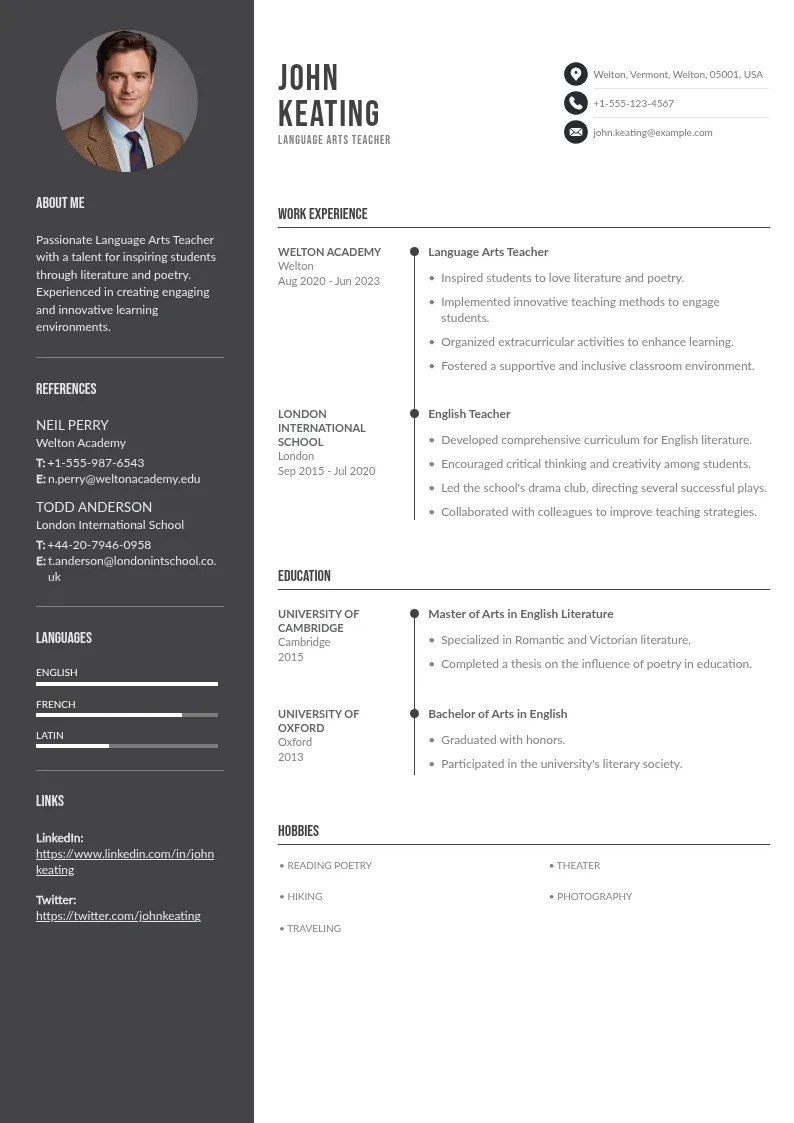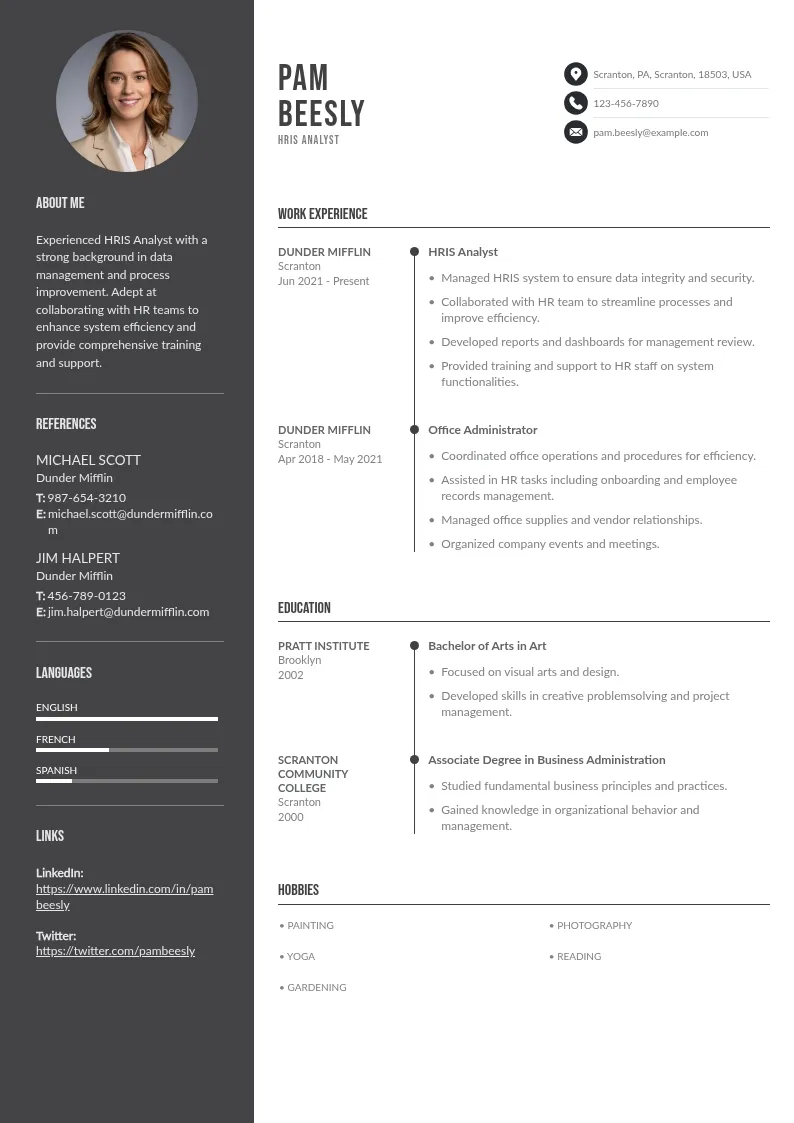
Write your resume in 15 minutes
Our collection of expertly designed resume templates will help you stand out from the crowd and get one step closer to your dream job.


To elevate your online tutoring, focus on the skills that set you apart. These are the tools that turn ordinary lessons into impactful learning experiences, making you not just a tutor, but a mentor, a guide, and a positive influence in your students' lives.
Here are some key insights you’ll gain from reading this article:
- Essential online tutor skills for effective teaching
- How to enhance student engagement and retention
- Importance of time management and adaptability
- Tools and technologies for online tutoring success
- Creative strategies to elevate your teaching
- Building strong, empathetic connections with students
12 Essential Skills for Online Tutors
Being an effective online tutor goes beyond just knowing your subject matter; it involves mastering key skills that make the virtual learning experience both successful and engaging. Here are the 12 essential skills every online tutor should master to create a thriving virtual classroom.

1. Time Management
Time is your most valuable resource, and managing it well is crucial for both you and your students. As an online tutor, you’re juggling lesson plans, student progress, and your own schedule. Effective time management ensures that each session is productive, allowing you to cover the necessary material while keeping your students engaged.
2. Communication Skills
Clear and effective communication is the foundation of successful teaching. It’s not just about speaking or writing well—it's about making sure your students understand, feel heard, and are motivated to learn. Strong communication skills help you convey complex concepts in a way that’s accessible and engaging. You’re also building rapport, which is vital for a positive learning experience.
3. Engagement & Stimulation
Keeping students engaged in a virtual environment can be challenging, but it’s one of the most important aspects of online tutoring. A stimulating learning environment makes all the difference between a student who is passively receiving information and one who is actively involved. By incorporating interactive activities, real-world examples, and a bit of fun into your lessons, you create a dynamic classroom where students are eager to participate and learn.
4. Adaptability & Curriculum Support
Every student learns differently, and being adaptable is key to meeting their diverse needs. As an online tutor, you need to be flexible in your teaching methods, ready to pivot when something isn’t working, and willing to tailor the curriculum to fit each student's learning style. Adaptability shows your commitment to student success, as you’re able to provide personalized support that helps each learner thrive.
5. Use of Feedback
Feedback is a powerful tool for growth—both for you and your students. Incorporating feedback into your teaching practice allows you to continuously improve and refine your methods. It’s about creating a feedback loop where students feel comfortable sharing their thoughts, and you actively listen and adjust your approach.
6. Continuous Learning & Subject Expertise
The world of education is constantly evolving, and staying current is essential to being an effective tutor. Continuous learning ensures that your knowledge remains fresh and relevant, allowing you to provide up-to-date information and insights to your students. It’s about more than just knowing your subject—it’s about being passionate enough to keep learning and growing.

7. Empathy & Relationship Building
Online learning can sometimes feel distant, making it all the more important to build strong, empathetic relationships with your students.
Empathy allows you to understand and relate to your students' challenges, creating a supportive environment where they feel safe and encouraged. When students trust you, they’re more likely to engage, ask questions, and fully participate in their learning.
8. Technological Proficiency
Technology is the backbone of online tutoring, and being proficient with the tools of the trade is non-negotiable. From virtual classrooms to collaborative tools, technological proficiency allows you to deliver seamless lessons and troubleshoot any issues that arise. When you’re comfortable with technology, you can focus on what truly matters: teaching and connecting with your students.
9. Patience & Positivity
Online tutoring can be challenging, making patience key for staying calm and supportive when things don’t go as planned. A positive attitude helps create an encouraging environment that keeps students motivated, even during struggles. Together, patience and positivity foster a safe space where students feel comfortable learning and growing from their mistakes.
10. Active Listening
Active listening means truly understanding your students’ concerns, questions, and feedback rather than just hearing them. This skill is vital for adapting your teaching to better meet their individual needs. By practicing active listening, you show students their voices matter, creating a more inclusive and responsive learning environment.
11. Leadership & Problem-Solving
As an online tutor, teaching critical thinking skills is essential for helping students make informed decisions and solve complex problems. By providing clear direction and empowering students to take charge of their learning, you foster their independence. Creative problem-solving allows you to guide students through challenges, inspiring them to face obstacles with confidence and determination.
12. Confidentiality
Your students trust you with their personal information, making it essential to protect that trust. Maintaining confidentiality is key to creating a secure and professional learning environment. By safeguarding student data, you not only protect their privacy but also uphold ethical standards, reinforcing your reputation as a trustworthy educator.

The Importance of Online Tutoring Skills
- Enhances student engagement and learning retention
- Facilitates clear and effective communication
- Improves time management for both tutor and student
- Builds rapport and trust in a virtual environment
- Adapts to diverse learning styles and needs
- Encourages active participation and collaboration
- Increases the efficiency of lesson delivery and feedback
How to Highlight Your Online Tutoring Skills in Your Resume, Cover Letter & Interview
When applying for online tutoring positions, showcasing your skills effectively can set you apart from other candidates. Whether you're crafting a resume, writing a cover letter, or preparing for an interview, here’s how to present your abilities with impact.
In Your Resume
Your resume is a snapshot of your qualifications, and it’s crucial to highlight your online tutoring skills clearly. Use a combination of a skills section and detailed bullet points under your previous experience to show how you’ve applied those skills in real-life tutoring situations.
If you are a fresher graduate stepping into the field, be sure to list your academic achievements and highlight relevant skills that showcase your potential for success in online tutoring.
In Your Cover Letter
Your cover letter allows you to showcase not only what skills you possess but how they align with the specific role you're applying for. Focus on how your online tutoring skills will directly benefit the company or institution.
In Your Interview
During the interview, it’s important to not just mention your skills but to back them up with examples. Be prepared to discuss specific scenarios where you’ve used your tutoring skills to solve problems or achieve results.

Tools and Technologies for Online Tutoring Success
Teaching online hinges on mastering the right tools as much as knowing your subject. The right setup ensures a smooth, effective session and minimizes technical hiccups.
1. Computer or Laptop
Your computer is your command center. An updated operating system (Windows 8 or above) and at least an i5 processor are non-negotiable.
This ensures your online courses run smoothly, your videos stream without a hitch, and you can handle multiple tasks without your system slowing you down. Think of it as your trusty sidekick, always ready to support you during your tutoring online adventures.
2. Noise-Cancellation Headset
Clarity is key when it comes to communication, especially in a virtual setting. A noise-cancellation headset ensures that your students hear you clearly, even if there’s background noise. It’s like having your own personal bubble of sound, making sure that what you say comes through loud and clear, no matter what’s happening around you.
3. Stable and Fast Internet
Your internet connection is your lifeline. A stable, fast connection with a minimum speed of 20mbps ensures that your online courses are smooth and uninterrupted. This isn’t just about avoiding awkward freeze frames—it’s about maintaining a consistent flow that keeps your students engaged and focused on learning.
4. Communication Apps
Staying connected with your students outside of class is crucial. Tools like Gmail, Outlook, Skype, and Teams help you manage communications efficiently. These apps are your virtual office, where you schedule meetings, share resources, and keep in touch with your students. They help you create a supportive learning environment by ensuring you’re always available to provide support when needed.
5. Software Proficiency
Knowing your way around software like Microsoft Office, Google Docs/Sheets/Slides, video creation tools like ScreenFlow or Loom, and educational platforms like Canvas or TutorCruncher is essential. These tools are the backbone of your online teaching toolkit, helping you create, organize, and deliver content effectively. Being proficient in these platforms ensures you can focus on tutoring online, rather than troubleshooting.
Enhancing Online Teaching Skills
No matter how great you are as a tutor, there’s always an opportunity to elevate your skills. Improving your teaching isn’t just about working harder—it’s about working smarter. By refining your approach, embracing innovative strategies, and adapting to your students’ evolving needs, you can take your online tutoring to the next level.

Set Clear Learning Objectives
Learning objectives act as the foundation for your lessons, giving direction to both you and your students. Setting specific, measurable goals allows students to track their progress and stay motivated. Regularly revisiting these objectives ensures that your teaching remains focused and aligned with student development, offering a clear path to success.
Familiarize Yourself with Tools and Technologies
Staying tech-savvy is crucial for online tutors in the rapidly changing digital landscape. By learning new platforms or mastering innovative tools, you can enhance the interactivity and engagement of your lessons. This not only keeps your teaching methods fresh but also demonstrates adaptability and creativity, ensuring your students get the most out of every session.
Use Diverse Assessment Methods
Assessing students effectively goes beyond traditional quizzes and tests. Incorporating various methods—like project-based learning, peer evaluations, and interactive quizzes—provides a more comprehensive understanding of student progress. Offering different types of assessments ensures that all students have opportunities to showcase their skills in ways that suit their strengths.
Incorporate Feedback
Actively seeking and implementing feedback from students is vital for growth as an online tutor. Listening to what your students need helps you adjust your teaching methods and create a more tailored learning experience. By being open to feedback, you create a positive learning environment where students feel heard and valued.
Pursue Continuous Education
As an online tutor, staying on top of new teaching techniques and industry trends is essential. Whether through workshops, formal courses, or self-study, continuous education helps you keep your skills sharp. By committing to your own growth, you inspire your students and ensure they benefit from the latest knowledge and strategies in your field.
Conclusion
Being an online tutor is about more than just delivering lessons—it's about inspiring, connecting, and guiding your students on their learning journey. By mastering the essential skills, embracing the right tools, and continuously pushing the boundaries of creativity and innovation, you transform from a teacher into a mentor who makes a lasting impact.
Keep honing your craft, stay passionate, and remember that your dedication is what truly shapes your students' success.

















